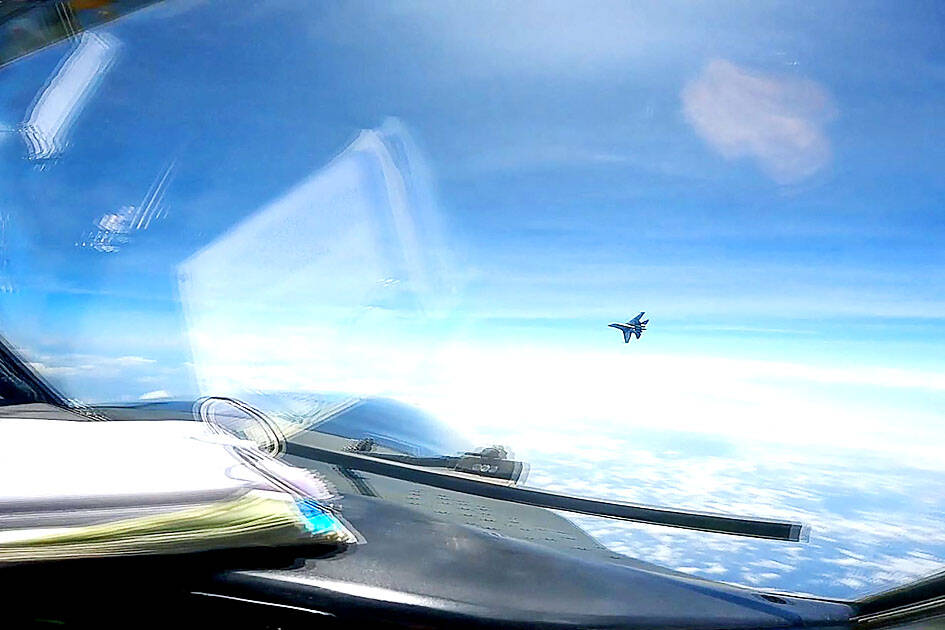Beijing yesterday blamed US “provocation” for an incident last week in which a Chinese plane crossed in front of a US surveillance aircraft over the South China Sea.
The incident came at a time of frayed ties between Washington and Beijing over issues including Taiwan and the shooting down of an alleged Chinese spy balloon that flew over the US this year.
“The United States’ long-term and frequent sending of ships and planes to conduct close surveillance on China seriously harms China’s national sovereignty and security,” Chinese Ministry of Foreign Affairs spokesperson Mao Ning (毛寧) said when asked about the latest incident.

Photo: AFP / Defense Visual Information Distribution System (DVIDS)
“This kind of provocative, dangerous activity is the cause of the security issues on the seas,” Mao said, calling on Washington to “immediately stop this form of dangerous provocation.”
“China will continue to take all necessary steps to resolutely protect its own sovereignty and security,” she said.
The US military on Tuesday said a Chinese fighter pilot had performed an “unnecessarily aggressive maneuver” near a US surveillance aircraft operating over the South China Sea last week.
Video footage released by the US military shows a Chinese fighter plane crossing in front of the US aircraft, which can be seen shaking from the resulting turbulence.
The Chinese plane “flew directly in front of and within 400 feet (122m) of the nose of the RC-135, forcing the US aircraft to fly through its wake turbulence” on Friday last week, the Indo-Pacific Command said in a statement.
“The RC-135 was conducting safe and routine operations over the South China Sea in international airspace, in accordance with international law,” it said.
The Pentagon said the incident was part of a pattern of behavior by China.
A senior US defense official said there has been an “alarming increase in the number of risky aerial intercepts and confrontations at sea” by Chinese aircraft and ships — actions that “have the potential to create an unsafe incident or miscalculation.”
The announcement of the latest incident came a day after the Pentagon said Beijing had refused a US invitation for US Secretary of Defense Lloyd Austin to meet his Chinese counterpart in Singapore this week.
The senior US defense official said the timing of the announcement of the South China Sea incident was unrelated to China’s refusal of the invitation, adding that the information “was subject to the US military declassification process and US diplomatic communication process.”
Beijing said in response to reports of the Singapore cancelation that the US was “entirely responsible for the current difficulties in exchanges between the two militaries.”

AIR SUPPORT: The Ministry of National Defense thanked the US for the delivery, adding that it was an indicator of the White House’s commitment to the Taiwan Relations Act Deputy Minister of National Defense Po Horng-huei (柏鴻輝) and Representative to the US Alexander Yui on Friday attended a delivery ceremony for the first of Taiwan’s long-awaited 66 F-16C/D Block 70 jets at a Lockheed Martin Corp factory in Greenville, South Carolina. “We are so proud to be the global home of the F-16 and to support Taiwan’s air defense capabilities,” US Representative William Timmons wrote on X, alongside a photograph of Taiwanese and US officials at the event. The F-16C/D Block 70 jets Taiwan ordered have the same capabilities as aircraft that had been upgraded to F-16Vs. The batch of Lockheed Martin

GRIDLOCK: The National Fire Agency’s Special Search and Rescue team is on standby to travel to the countries to help out with the rescue effort A powerful earthquake rocked Myanmar and neighboring Thailand yesterday, killing at least three people in Bangkok and burying dozens when a high-rise building under construction collapsed. Footage shared on social media from Myanmar’s second-largest city showed widespread destruction, raising fears that many were trapped under the rubble or killed. The magnitude 7.7 earthquake, with an epicenter near Mandalay in Myanmar, struck at midday and was followed by a strong magnitude 6.4 aftershock. The extent of death, injury and destruction — especially in Myanmar, which is embroiled in a civil war and where information is tightly controlled at the best of times —

Taiwan was ranked the fourth-safest country in the world with a score of 82.9, trailing only Andorra, the United Arab Emirates and Qatar in Numbeo’s Safety Index by Country report. Taiwan’s score improved by 0.1 points compared with last year’s mid-year report, which had Taiwan fourth with a score of 82.8. However, both scores were lower than in last year’s first review, when Taiwan scored 83.3, and are a long way from when Taiwan was named the second-safest country in the world in 2021, scoring 84.8. Taiwan ranked higher than Singapore in ninth with a score of 77.4 and Japan in 10th with

SECURITY RISK: If there is a conflict between China and Taiwan, ‘there would likely be significant consequences to global economic and security interests,’ it said China remains the top military and cyber threat to the US and continues to make progress on capabilities to seize Taiwan, a report by US intelligence agencies said on Tuesday. The report provides an overview of the “collective insights” of top US intelligence agencies about the security threats to the US posed by foreign nations and criminal organizations. In its Annual Threat Assessment, the agencies divided threats facing the US into two broad categories, “nonstate transnational criminals and terrorists” and “major state actors,” with China, Russia, Iran and North Korea named. Of those countries, “China presents the most comprehensive and robust military threat